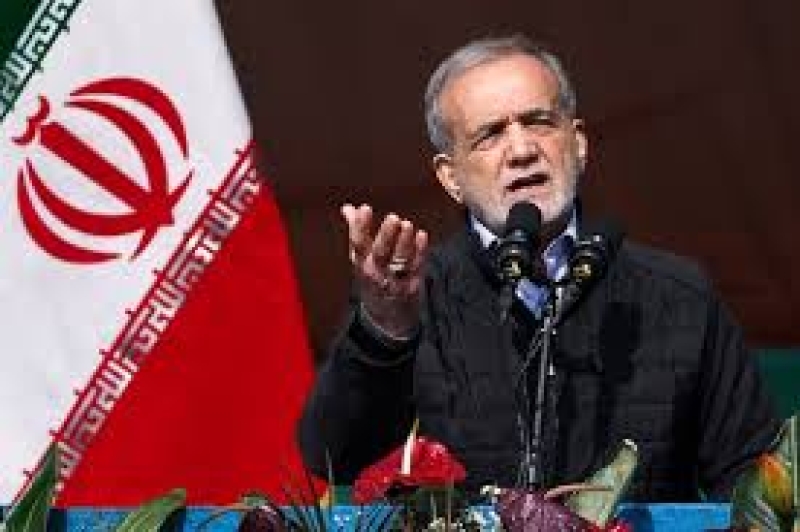- NYT paints troubling, one-sided view of Bangladesh |
- Two brothers killed in Narsingdi over extortion refusal |
- Death toll from Myanmar earthquake surpasses 1,700 |
- Children’s entertainment centres buzz with Eid crowds |
- PM Modi greets Dr Yunus, seeking Dhaka-Delhi stronger bond |
Iran Rejects Direct Talks with U.S. Following Trump’s Letter

Iran's President Masoud Pezeshkian confirmed on Sunday that the Islamic Republic has rejected direct negotiations with the United States over its advancing nuclear program. This marks Tehran's first official response to a letter sent by President Donald Trump to Iran's Supreme Leader, Ayatollah Ali Khamenei.
Pezeshkian indicated that while direct talks were off the table, Iran remains open to indirect negotiations through mediators, such as Oman. However, these discussions have yielded little progress since Trump unilaterally withdrew the U.S. from the 2015 nuclear deal in 2018, a move that exacerbated tensions between the two nations.
In the years since, regional instability has escalated, with numerous incidents at sea and on land, including Israel’s attacks on militant leaders tied to Iran’s “Axis of Resistance,” and U.S. airstrikes against Iranian-backed Houthi rebels in Yemen. The ongoing tensions have raised concerns over potential military action targeting Iran’s nuclear facilities.
“We do not avoid talks, but the breach of promises has caused problems,” Pezeshkian said in a televised Cabinet meeting. “The U.S. must prove it can build trust.”
The White House, State Department, and other U.S. officials refrained from commenting immediately, but Trump made his position clear ahead of Pezeshkian’s remarks. "If they don’t make a deal, there will be bombing, and it will be bombing the likes of which they have never seen before," Trump warned in an NBC interview.
The rejection of direct talks signals a shift in Iran's stance, especially following the election of Pezeshkian, who had campaigned on re-engaging with the West. However, this policy appears to have hardened after Khamenei’s condemnation of Trump's approach in February, deeming talks with the U.S. "not intelligent, wise, or honorable."
Mixed messages have emanated from Tehran, including calls at Quds Day rallies for "Death to Israel," but conspicuously omitting "Death to America" chants. This shift in rhetoric is reflected in recent demonstrations, and in an underground missile base unveiling by Iran’s hardline Revolutionary Guard, which featured the desecration of an Israeli flag.
The growing confrontation between the U.S. and Iran is further exacerbated by U.S. military actions. Last week, Iranian officials made veiled threats regarding potential attacks on U.S. bases in the Middle East, including on the island of Diego Garcia, home to American stealth bombers used in the conflict in Yemen.
The risk of military escalation looms large, with Tehran issuing stark warnings to Washington. Iranian Parliament Speaker Mohammad Bagher Qalibaf cautioned, "If they violate Iran’s sovereignty, it will be like a spark in a gunpowder depot, setting the entire region ablaze."
Despite two Iranian missile and drone attacks on Israel causing limited damage, Israel responded by neutralizing Iran’s air defense systems, signaling an ongoing standoff.
Trump's letter to Khamenei, sent on March 12, was a rare diplomatic gesture, but the specifics of its contents remain unclear. Trump previously mentioned it in a TV interview, expressing hopes that negotiations could avert military conflict. His letter echoes his outreach to North Korea’s Kim Jong Un, which ultimately led to high-profile but unsuccessful summits.
The backdrop to these events is the growing fear that Iran is nearing the ability to produce nuclear weapons. While Iran insists its nuclear program is for peaceful purposes, the U.N.’s nuclear watchdog reported in February that Tehran has made significant progress in enriching uranium to near weapons-grade levels.
Tensions remain high, with Trump’s administration insisting it will prevent Iran from acquiring nuclear weapons at all costs, a stance shared by Israel. Meanwhile, Iran’s suspicion of U.S. intentions is deepened by the 2020 drone strike that killed General Qassem Soleimani, a move that dramatically soured relations and led to renewed threats against Trump.
As the situation continues to unfold, the prospects for diplomatic resolution seem increasingly distant.

